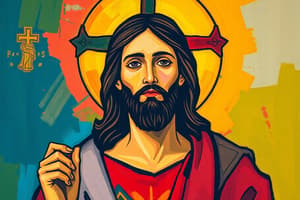Podcast
Questions and Answers
What is the central prayer in Judaism known as?
What is the central prayer in Judaism known as?
- Shema (correct)
- Salat
- Shahada
- Zakat
Islam recognizes Jesus as the Messiah.
Islam recognizes Jesus as the Messiah.
False (B)
What are the Five Pillars of Islam?
What are the Five Pillars of Islam?
Shahada, Salat, Zakat, Sawm, Hajj
The ______ is the holy book of Islam.
The ______ is the holy book of Islam.
Match each religion with its key scripture:
Match each religion with its key scripture:
Which of the following is NOT a characteristic of monotheistic religions?
Which of the following is NOT a characteristic of monotheistic religions?
Ethical living is a major focus in both Judaism and Islam.
Ethical living is a major focus in both Judaism and Islam.
What does the term 'Tauba' refer to in Islam?
What does the term 'Tauba' refer to in Islam?
What is the ultimate spiritual goal in Hinduism?
What is the ultimate spiritual goal in Hinduism?
Christianity teaches that salvation is only achievable through good deeds.
Christianity teaches that salvation is only achievable through good deeds.
Who founded Buddhism?
Who founded Buddhism?
The three main gods in Hinduism are Brahma, Vishnu, and _______.
The three main gods in Hinduism are Brahma, Vishnu, and _______.
According to Buddhism, what is the path to end suffering called?
According to Buddhism, what is the path to end suffering called?
Match each term with its correct description:
Match each term with its correct description:
Judaism is considered the oldest polytheistic religion.
Judaism is considered the oldest polytheistic religion.
What is the cycle of birth, death, and rebirth called in Hinduism?
What is the cycle of birth, death, and rebirth called in Hinduism?
Flashcards
Monotheism
Monotheism
The belief in one God, as opposed to multiple deities.
Polytheism
Polytheism
The belief in multiple gods.
Omnipotent God
Omnipotent God
The belief that God is the creator and ruler of everything. He is involved in the world and is all-powerful.
Shema
Shema
Signup and view all the flashcards
Messiah in Judaism
Messiah in Judaism
Signup and view all the flashcards
Torah
Torah
Signup and view all the flashcards
Talmud
Talmud
Signup and view all the flashcards
Quran
Quran
Signup and view all the flashcards
What is sin in Christianity?
What is sin in Christianity?
Signup and view all the flashcards
What is the Holy Trinity?
What is the Holy Trinity?
Signup and view all the flashcards
What are angels in Christianity?
What are angels in Christianity?
Signup and view all the flashcards
How is salvation achieved in Christianity?
How is salvation achieved in Christianity?
Signup and view all the flashcards
What is reincarnation in Hinduism?
What is reincarnation in Hinduism?
Signup and view all the flashcards
What is karma in Hinduism?
What is karma in Hinduism?
Signup and view all the flashcards
What are the scriptures of Hinduism?
What are the scriptures of Hinduism?
Signup and view all the flashcards
What is moksha in Hinduism?
What is moksha in Hinduism?
Signup and view all the flashcards
Study Notes
Christianity
- Humanity was separated from God through sin, but salvation is possible through Jesus Christ's sacrifice.
- Belief in the Holy Trinity: Father, Son, and Holy Spirit.
- Angels were created by God with specific roles, including archangels like Michael and Gabriel.
- Other angels include cherubim, seraphim, thrones, and guardian angels assigned to humans.
- Salvation is achieved through Jesus' sacrifice, offering grace and communion with God, emphasizing faith and repentance.
- The Bible (Old and New Testaments) is the scripture. Old Testament covers history and law, and New Testament covers the life and teachings of Jesus.
- Afterlife is eternal life in Heaven or Hell, based on faith and deeds.
Hinduism
- A diverse collection of religious traditions without a single founder or unified doctrine.
- Over 1.25 billion adherents, primarily in India.
- Reincarnation: The soul is reborn in different forms after death.
- Karma: Actions determine one's destiny.
- Dharma: Righteous duty aligned with cosmic order.
- Samsara: The cycle of birth, death, and rebirth.
- Moksha: Liberation from samsara, the ultimate spiritual goal.
- Polytheistic, with a pantheon including Brahma (creator), Vishnu (preserver), and Shiva (destroyer).
- Figures like Mahatma Gandhi emphasized non-violence.
- Practices like yoga and meditation are globally popular.
- Scriptures include Vedas, Upanishads, Bhagavad Gita, and Ramayana.
- Afterlife involves reincarnation until moksha is achieved.
Buddhism
- Founded by Siddhartha Gautama (Buddha) in the 5th century BCE.
- Four Noble Truths: Suffering exists, has a cause, can end, and there is a path to end it.
- Eightfold Path: Right view, intention, speech, action, livelihood, effort, mindfulness, and concentration.
- Rejects the idea of a creator god, focusing on personal effort for enlightenment.
- Tripitaka (Pali Canon) and Mahayana Sutras are the scriptures.
- Rebirth until nirvana (end of suffering) is achieved.
Judaism
- One of the oldest monotheistic religions, founded over 3,500 years ago.
- Key events: Exodus from Egypt, giving of the Ten Commandments.
- Monotheistic, with God as the creator and omnipotent ruler.
- Central prayer: Shema ("Hear, O Israel, the Lord is our God, the Lord is One").
- A future temporal leader (Messiah) to restore the Kingdom of David.
- Jews reject Jesus as the Messiah.
- The Torah guides life and ethics, and the Talmud offers commentary.
- Hebrew Bible (Tanakh), including Torah, Prophets (Nevi'im), and Writings (Ketuvim) are the scriptures.
- Focus on ethical living and awaiting the Messiah.
- Afterlife focuses on ethical living and awaiting the Messiah.
Islam
- Monotheistic; Allah is the sole God, with Muhammad as his prophet.
- Pride and rebellion are humanity's failings; submission to Allah (Islam) is the virtue.
- Five Pillars: Shahada (faith), Salat (prayer), Zakat (charity), Sawm (fasting), Hajj (pilgrimage).
- Salvation is based on faith, good deeds, and submission to Allah's will.
- Tauba (repentance) can redeem sinners.
- The Quran (holy book) and Hadith (prophet's sayings) are the scriptures.
- Souls are judged on the Day of Judgment and sent to Paradise or Hell.
Studying That Suits You
Use AI to generate personalized quizzes and flashcards to suit your learning preferences.




